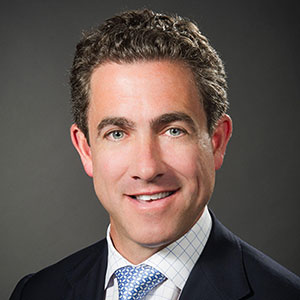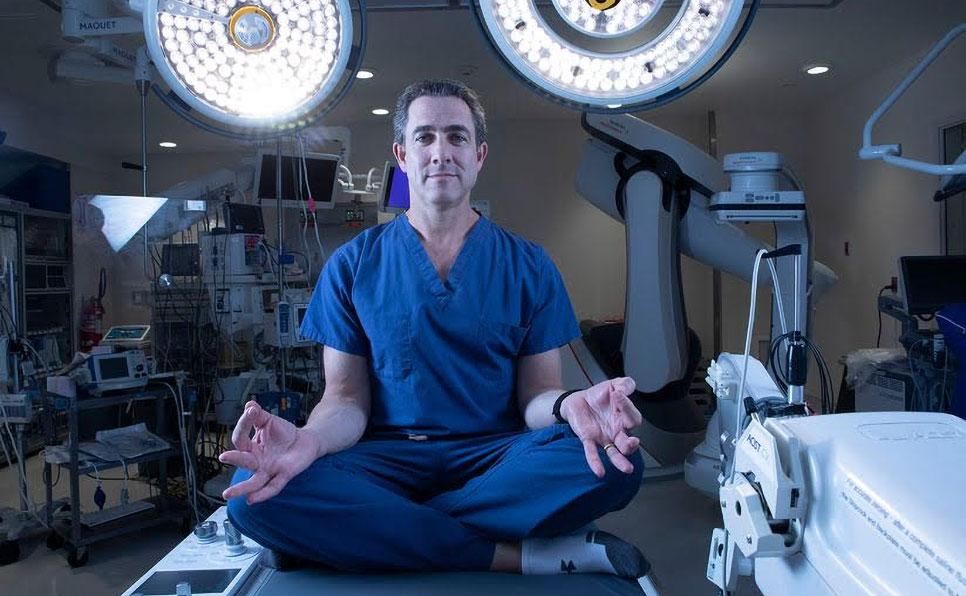 Dr. John Boockvar, an accomplished neurosurgeon, currently serves as Vice-Chair of the Department of Neurosurgery at Lenox Hill Hospital in New York City, as well as Director of the Brain Tumor and Pituitary/Neuroendocrine Center and Professor of Neurosurgery and Otolaryngology at the Zucker School of Medicine at Hofstra/Northwell. Very well-known for his innovative clinical trials for Glioblastoma, an aggressive and fatal brain cancer, Dr. Boockvar was also featured as a principal character in Lenox Hill, a compelling nine-episode Netflix docu-series, which followed part of his personal and professional journey as a neurosurgeon. He is also globally recognized for his profound dedication to the comfort and well-being of his patients and their families, which — on top of his remarkable clinical achievements — make him an extremely sought-after physician.
Dr. John Boockvar, an accomplished neurosurgeon, currently serves as Vice-Chair of the Department of Neurosurgery at Lenox Hill Hospital in New York City, as well as Director of the Brain Tumor and Pituitary/Neuroendocrine Center and Professor of Neurosurgery and Otolaryngology at the Zucker School of Medicine at Hofstra/Northwell. Very well-known for his innovative clinical trials for Glioblastoma, an aggressive and fatal brain cancer, Dr. Boockvar was also featured as a principal character in Lenox Hill, a compelling nine-episode Netflix docu-series, which followed part of his personal and professional journey as a neurosurgeon. He is also globally recognized for his profound dedication to the comfort and well-being of his patients and their families, which — on top of his remarkable clinical achievements — make him an extremely sought-after physician.
Q: What is your outlook for opportunities for women in neurosurgery?
Dr. B: We’re moving aggressively as an organization to be more inclusive of women and minorities and each year, more and more women are choosing the field of neurosurgery, which is terrific. Medical school classes are now 51% female.
Q: How has that come about?
Dr. B: Ultimately, more women are entering the field as attendings, which I think has given more medical students, college students, and residents the opportunity to see women role models in a field that has been historically male. These female pioneers have helped to break the gender barriers to make neurosurgery more inclusive of women.
Q: Historically, why do you think such a small percentage of women pursued neurosurgery?
Dr. B: Traditionally, many surgery subspecialties were male-dominated. Pre- and Post-World War II, there was inherent sexism associated with women staying home and raising families so pursuing a surgical subspecialty was rarely encouraged. In addition, the men in these fields feared that women would get pregnant during their residencies or as faculty members leaving a clinical void to fill. If women were interested in medicine, they were steered into nursing which had more work flexibility.
Q: What have hospitals done to support their female doctors who juggle career and family?
Dr. B: Well, the rules have changed. Not only have there been changes for women in medicine who get pregnant but also for men whose wives have given birth. Maternity and Paternity leaves of absence are acceptable now and it’s not even a discussion. Going out on six months of maternity in my year of residency would have been frowned upon. Now, everyone understands that the most important part of a successful work environment is one that includes adequate time at home for raising the family.
Q: Does being a Neurosurgeon impinge on personal life any more so than other surgical specialties?
Dr. B: Every field is different. With neurosurgery or an acute field like neurosurgery where you’re constantly on-call, there’s no doubt that the lifestyle is very different from a dermatology or ophthalmology practice. With that, you can often decide that you are going to see patients on weekdays from nine A.M. to four P.M. and be closed on weekends. In neurosurgery, you might get called in the middle of the night and on weekends. If you are raising a family or have newborns that are up all night who need to be breastfed, that’s something one has to figure out how to balance. Mothers and fathers alike face this dilemma; I have four kids and I was constantly up in the middle of the night bottle-feeding them in between shifts. In fact, there is a joke in my family that my son is an early riser because when he was a baby during my residency, we put him in the dining room to sleep and I was constantly waking him up at ridiculous hours to go to the hospital.
Q: Are there other medical specialties attracting women?
Dr. B: I don’t have the exact numbers but I would say that radiology, dermatology, ophthalmology, pediatrics, family practice, and anesthesiology tend to have larger numbers of female doctors, especially those women who are interested in raising families because of the ability to have more control over the schedule.
Q: Do you see more women pursuing neurosurgery fellowships now?
Dr. B: Yes. In general, there are more women coming through the fellowship programs because more are getting accepted to medical school. When you have a larger pool of women coming through at that rank who are interested in neurosurgery, it’s likely that a bigger percentage might want to focus on something specific within that field and pursue a fellowship such as in neurosurgery.
**full episodes of “Lenox Hill” can be watched here

Haley Gross is a senior at The University of Texas at Austin, majoring in Journalism at Moody College of Communications (Class of 2022). She started interning for womensbiz.US this past summer and continues to do so while also working as a student clinical researcher at UT Health Austin. She is really enjoying both of these work experiences and hopes to go to medical school in the future.

